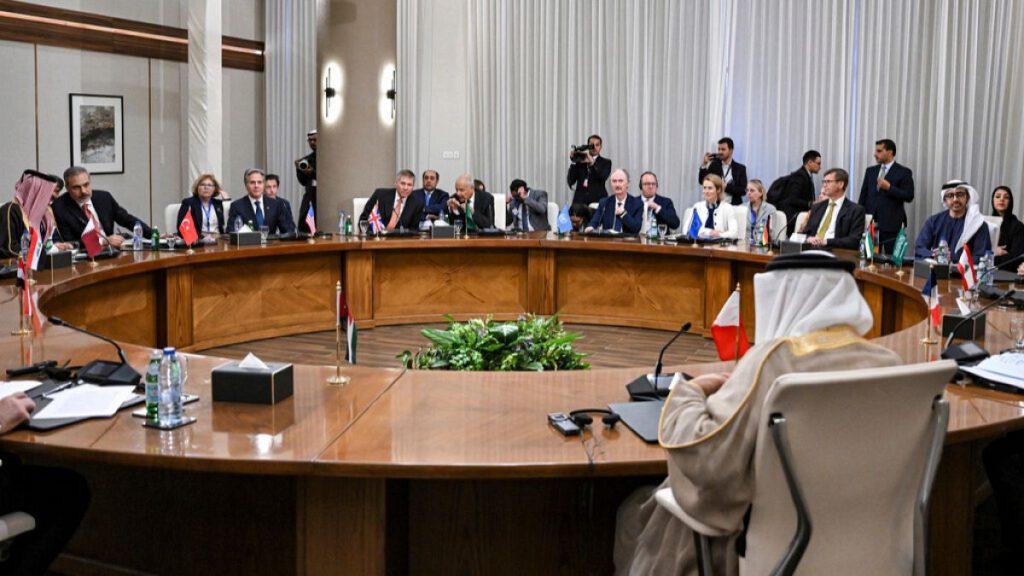The recent meeting of top diplomats from the US, the Arab League, and Turkey in Aqaba, Jordan, signifies a concerted effort to shape the future of Syria in the wake of the Assad regime’s downfall. The gathering, which included twelve foreign ministers and senior officials from the EU and UN, aimed to establish a common vision for Syria’s political transition, prioritizing inclusivity, respect for human rights, counter-terrorism measures, and the secure disposal of chemical weapons. This diplomatic initiative underscores the international community’s recognition of the critical need for a stable and representative government in Syria, capable of addressing the multifaceted challenges facing the nation.
US Secretary of State Antony Blinken, a key participant in the Aqaba meeting, emphasized the importance of a Syrian-led transition process, highlighting the necessity of inclusivity and respect for minority rights. He reiterated the need for a government that actively combats terrorism and addresses the legacy of chemical weapons left by the Assad regime. Blinken’s presence in the region, as part of a broader Middle East tour including stops in Turkey and Iraq, underscores the US commitment to engaging with regional partners and supporting a stable transition in Syria. His meetings with various leaders, including Iraq’s Prime Minister and the UN Special Envoy for Syria, further demonstrate the US focus on collaborative efforts to address the Syrian crisis.
The discussions in Aqaba revolved around establishing a framework for a political transition that reflects the aspirations of the Syrian people. While no Syrian representatives attended the meeting, the focus remained on fostering a process that ultimately empowers Syrians to determine their own political future. UN Special Envoy Geir Pedersen stressed the importance of a credible and inclusive political process that unites all Syrian communities. This approach acknowledges the deep societal divisions within Syria and emphasizes the need for reconciliation and consensus-building to achieve lasting stability. Furthermore, the urgent need to prevent the collapse of state institutions and ensure the continued flow of humanitarian aid was a key concern, reflecting the precarious security and humanitarian situation in Syria.
The collapse of the Assad regime raises significant concerns about potential instability and further turmoil in an already volatile region. The ongoing Israel-Hamas conflict and the tensions between Israel and Hezbollah in Lebanon add to the complexities of the situation, demanding a delicate and comprehensive approach to any proposed transition process in Syria. The regional implications of the Syrian crisis necessitate close coordination among international actors to mitigate the risks of further destabilization and prevent the emergence of power vacuums that could be exploited by extremist groups. The timing of the Aqaba meeting, against this backdrop of regional tensions, underscores the urgency of addressing the Syrian situation to prevent further escalation of conflict.
The Aqaba meeting represents a critical juncture in the international community’s efforts to shape Syria’s future. The emphasis on a Syrian-led transition, coupled with the focus on inclusivity, human rights, and counter-terrorism, reflects a broad understanding of the necessary elements for a stable and prosperous Syria. However, the absence of Syrian representatives raises questions about the ultimate effectiveness of these discussions in achieving a truly representative transition. The international community must navigate the complex political landscape carefully, ensuring that any proposed solution respects the sovereignty of the Syrian people while addressing the legitimate security concerns of regional actors.
The road ahead for Syria remains uncertain, fraught with challenges and potential pitfalls. The international community’s commitment to a collaborative approach, as exemplified by the Aqaba meeting, offers a glimmer of hope for a peaceful and stable future for Syria. However, the success of this endeavor will hinge on the ability to translate the principles discussed into concrete actions that empower the Syrian people to shape their own destiny, while simultaneously addressing the legitimate security concerns of the region. The complex dynamics within Syria and the broader regional context demand a sustained and carefully calibrated approach to ensure that the transition process is both inclusive and effective, leading to a more stable and prosperous future for Syria and the wider region.














